Essential Questions Every Beginner Investor Should Ask Before Starting
This article highlights essential questions that beginner investors should ask before starting their investment journey. It covers why investing matters, retirement considerations like 401(k) and IRA, investment options, determining investment amounts, timing, and realistic return expectations. Designed for new investors, the guidance aims to build confidence and foster informed decision-making for long-term financial success. Whether you're just starting or seeking clarity, these insights help lay a strong foundation for successful investing and wealth accumulation.

Essential Questions Every Beginner Investor Should Ask Before Starting
Many new investors are drawn to the potential profits in the stock market after seeing friends succeed, but often lack proper knowledge about where to begin. Beginner investors are those interested in investing but unsure of the initial steps to take.
Common challenges include poor market timing and following trends blindly.
Regardless of experience level, understanding the fundamentals of investing can help prevent unnecessary losses.
Here are crucial questions every beginner investor should consider before committing funds.
Why should I invest?
Realizing the importance of investing often comes with age. Investing is key to securing finances for retirement, especially as you approach your later years. Seeking advice from financial advisors can help determine the best investment strategies for future stability.
Should I contribute to a 401(k) and IRA?
Many employers contribute a percentage toward your 401(k), sometimes matching your contributions. This matching essentially doubles your returns. If your employer doesn’t match, you can still maximize your savings through an IRA, which complements your retirement plan. Combining both accounts can enhance your financial security in retirement.
What investment options are available?
If retirement planning is your goal, target-date funds are a suitable choice. They offer diversified investments within a single mutual fund, combining stocks, bonds, and other assets. Funds like Vanguard index funds or Fidelity’s 2040 fund become more conservative over time, providing stability as you age.
How much should I invest?
Using a retirement calculator can help you estimate a safe investment amount. Adjusting your contributions based on this can ensure a comfortable retirement fund.
When is the ideal time to start investing?
There’s no perfect age, but earlier is better. Beginning at 25 provides decades to accumulate wealth, making future retirement more secure.
What are realistic investment returns?
Expect market fluctuations. Long-term investments tend to yield better results, so maintain realistic expectations and focus on your goals.
Beginners should stay informed and cautious to avoid confusion and pitfalls when entering the investment world.










